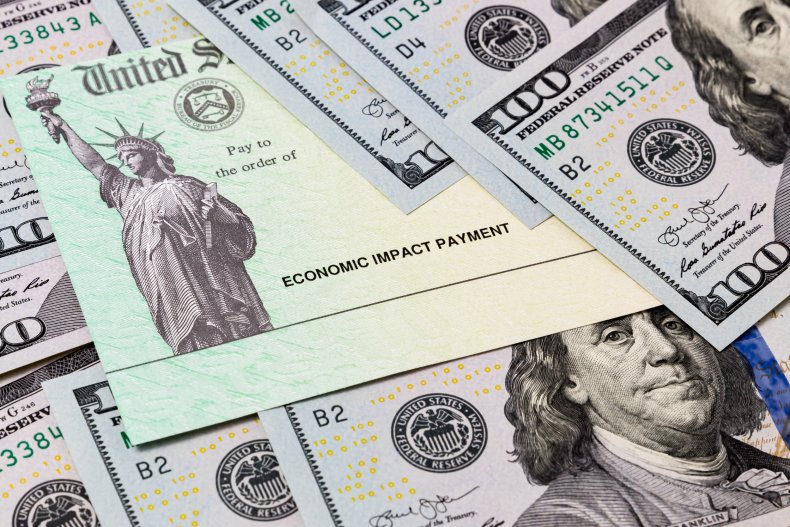Fourth Stimulus Check: 3 Reasons Why it Won't Happen
While there is plenty of public desire for further stimulus check payments, economic circumstances and the state of the fight against COVID-19 make the prospect of another round increasingly unlikely.
A petition calling for monthly $2,000 stimulus checks has hit 2.5 million signatures, and previously there has been support from some lawmakers—including Vice President Kamala Harris herself when she was a senator—for recurring payments.
However, though some lawmakers have backed more stimulus checks there is also major hesitance from others—particularly among the GOP—over mounting spending.
The last round of stimulus checks, for example, was part of the American Rescue Plan which only passed through reconciliation. No Republican lawmakers voted for its passage.
Below, Newsweek looks at three key reasons why further checks may not be sent.
Economic Recovery
The unprecedented levels of spending through previous packages have been made in the face of a similarly unprecedented economic situation. Lockdowns amid the COVID-19 pandemic saw businesses suffer massively, with job numbers plummeting as a result.
However, figures are beginning to show signs of improvement. The June jobs report, for example, showed nonfarm payrolls rising by 850,000, though the unemployment rate did rise to 5.9 percent. That is still well down from the 14.7 percent at its pandemic peak.
Economists have also predicted a "hiring boom," as previously reported by Newsweek.
Such a prospect weakens the arguments for another round of checks, as do the various economic forecasts of a formidable run of U.S. GDP growth as it exits the pandemic. The economy is going in the right direction again.
Vaccine Rollout
The major factor in the steady return to normalcy has been the vaccine rollout. President Joe Biden harked to this while commenting on June's jobs report.
"This is historic progress, pulling our economy out of the worst crisis in 100 years, driven in part by our dramatic progress in vaccinating our nation and beating back the pandemic," he said last Friday.
Biden missed his target of 70 percent of adults having received one vaccine dose by July 4. Still, Centers for Disease Control and Prevention figures show that 67.1 percent of those over 18 in the United States have had one dose.
The nation continues to proceed with some caution as variants are prompting a rise in cases in some areas. But vaccinating more than two-thirds of American adults marks a major step in the return to life as it was pre-pandemic.
One study from Israel suggested that the Pfizer vaccine, in particular, may be less effective at preventing people from catching the Delta variant. But it also appears to remain largely effective at preventing serious symptoms or hospitalizations from it.
Again, this ability to at least substantially dampen the impact of catching the virus marks a positive sign in life shifting back to normal.
July Fourth celebrations, for example, were a clear contrast to last year—with people able to gather in a way that was not possible during the worst moments of the pandemic.
Biden used this example of people coming back together as a means to encourage more people to get vaccinated.
Such a shift back to life as it was is likely to see the nation's, and thus individuals', economic fortunes improve—in contrast to the previous plunges which saw lawmakers rally behind relief measures.
Senate Resistance
The composition of the Senate also presents another hurdle to more stimulus checks. Democratic lawmakers have been the main advocates of new checks, while Republicans have largely been hesitant of more federal outlays.
The Democratic majority in the House is slim but it would feasibly be strong enough for legislation proposing a fourth round of stimulus checks to pass the lower chamber.
However, the Senate is much trickier. The upper chamber is split 50-50, with Democrats able to produce a majority in tie-break situations with the vice president's deciding vote.
But to avoid a filibuster effort from the Republicans, 60 votes in the upper chamber are needed. While some Democrats have suggested eliminating the filibuster, there is firm resistance to this within their own caucus.
Given the backlash against the Democrats' desired spending last time out, it looks unlikely 10 Republicans in the upper chamber would get on board with another round of checks.
And that would also depend on the uniting of the entire Democratic caucus in the upper chamber. Some Democratic senators on the party's right may be reluctant, such as Sen. Joe Manchin (D-WV), who questioned the breadth of eligibility for the checks in the past.
The Democrats were only able to avoid the filibuster by using reconciliation last time out, an act that enraged the GOP who bemoaned such a move following Biden's calls for bipartisanship.
Reconciliation—which the Democrats cannot use limitlessly—still requires a majority vote and, after Manchin's earlier reluctance over the previous round of checks, it is not clear that the Democratic caucus is unanimous on a fourth payment.
Moreover, the Democratic priority is currently infrastructure. They may end up using the reconciliation process this year on Biden's vast infrastructure package, which currently does not include spending on a fourth stimulus check.


